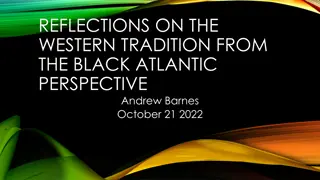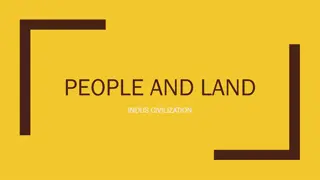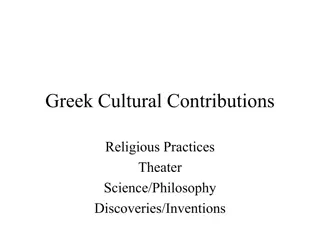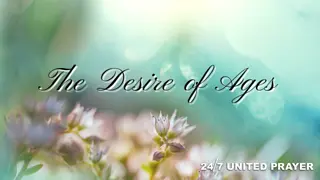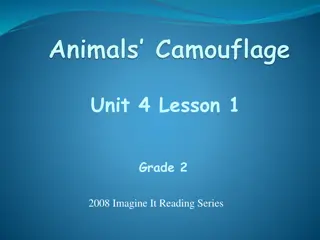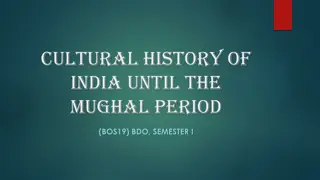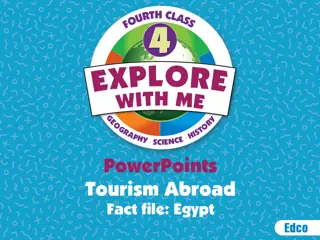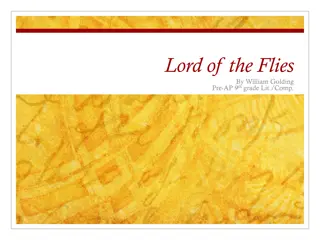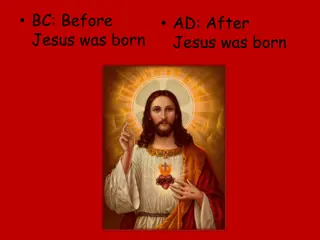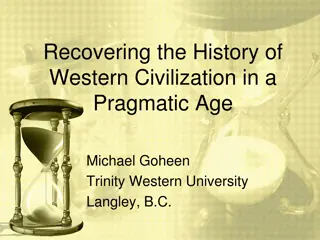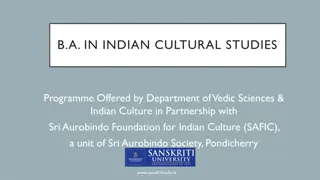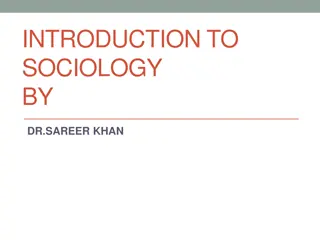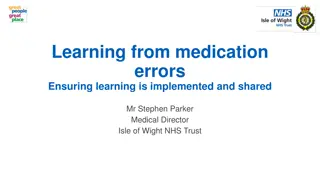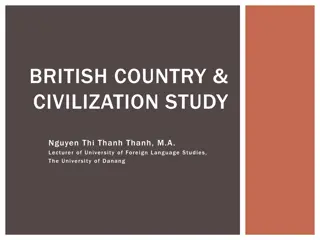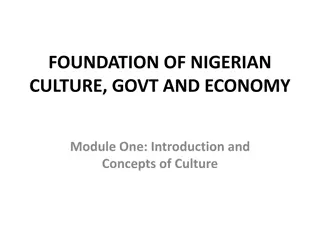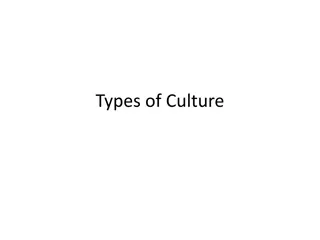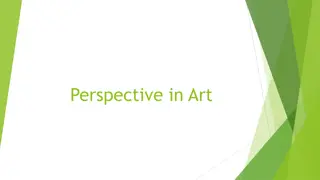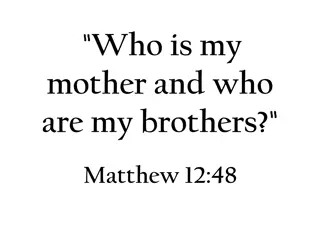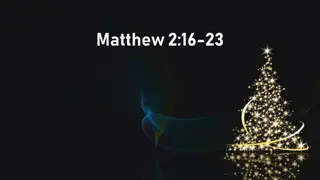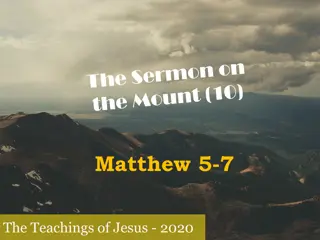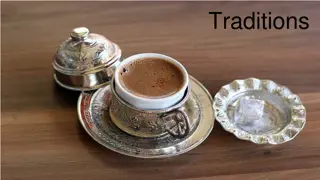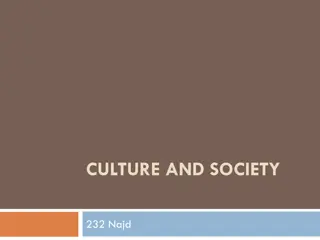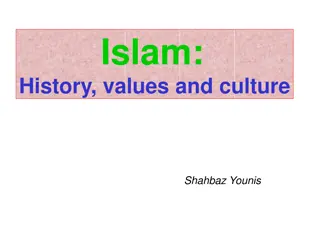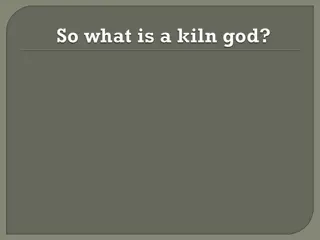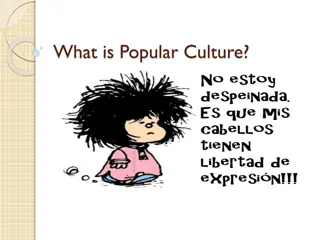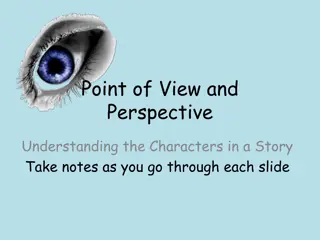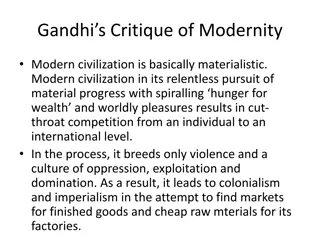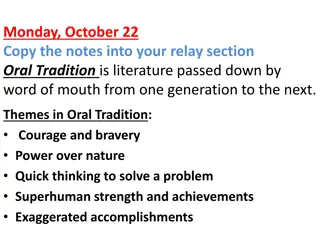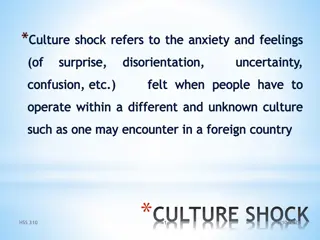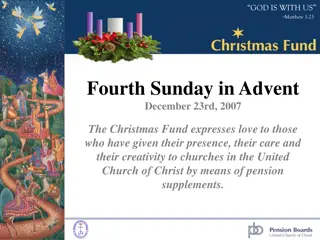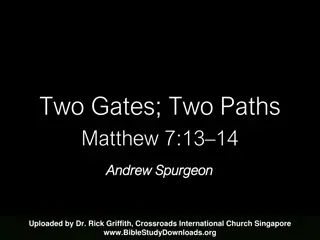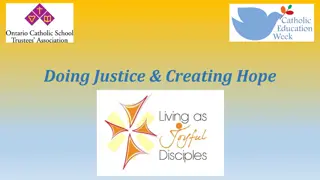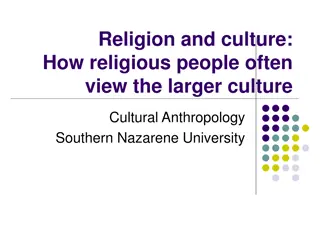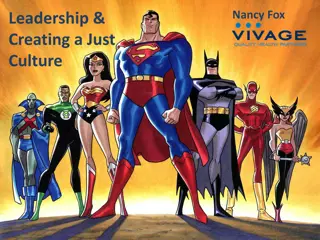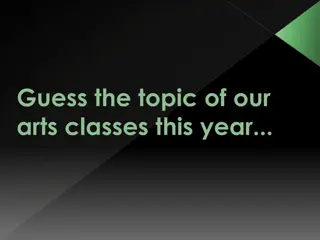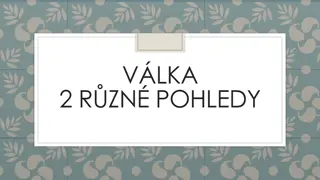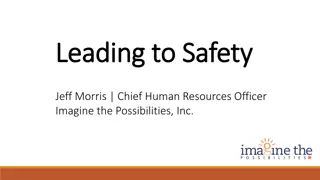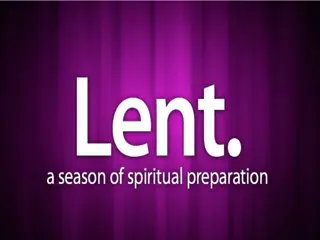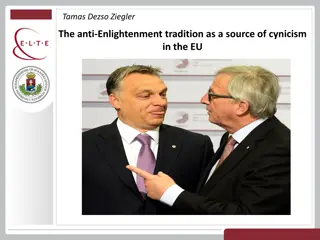Exploring Culture, Civilization, and Tradition Through Matthew Arnold's Perspective
Delve into the intricate relationship between culture, civilization, and tradition, as perceived through the teachings of Matthew Arnold. Unveil the essence of what constitutes a cultured individual and a civilized society, while navigating the challenges posed by shifting societal dynamics. Arnold's insights shed light on the significance of culture in maintaining societal order and fostering collective growth amid the complexities of modernity.
Download Presentation

Please find below an Image/Link to download the presentation.
The content on the website is provided AS IS for your information and personal use only. It may not be sold, licensed, or shared on other websites without obtaining consent from the author. Download presentation by click this link. If you encounter any issues during the download, it is possible that the publisher has removed the file from their server.
E N D
Presentation Transcript
CULTURE AND CIVILIZATION Week 3
QUESTIONS TO CONSIDER What makes a person cultured ? What makes a society civilized? Provide one cultural example of something that represents the best that has been thought our said ?
CULTURE AND CIVILIZATION TRADITION Power: Emanates from Crown/Elites governs subordinate classes The proletariate knew their place 19thCentury: Industrialization & Urbanization = shifts relationship End of common culture; emergence of mass (commercial culture/standardization/mass production) & subcultures Threatened traditional notions of cultural cohesion (dismantlement) and social stability (direct challenges to political and cultural authority) = Destabilizing of the Social Order! Collapse of Authority! Hearkens back to a mythic past; Barbarism threatens Civilization
MATTHEW ARNOLD: CULTURE AND ANARCHY (1867-9) Culture = The best which has been thought and said Our lives and their value depend upon the fresh and free play of the best thoughts upon our stock notions and habits All men can pursue perfection through attention to sweetness and light A national glow of life and thought occurs when the whole of society is in the fullest measure permeated by thought, sensible to beauty, intelligent and alive. Culture nourishes us beyond class relationships towards a profound sense of settled order and security We should follow reason, not our impulses; authority should assure this We need to disentangle ourselves from the machinery in pursuit of perfection in our humanity Culture = order = society Anarchy = bad (revolutionary activities/riots do not help society); should be forbidden and repressed by law that is authoritative and sovereign (STATE) State is the embodiment and progenitor of culture; must be protected
MATTHEW ARNOLD Inaugurates tradition positioning popular culture in broader framework of Culture Draws upon Romantic tradition (Coleridge) Dominant theoretical framework up until the 1950s; enormous influence IDEAS: Class Nature of his discourse Culture is a balm to minister to the diseased spirit of the time Culture is the seeking of culture Anarchy (popular culture) is a disruptive force; must be policed; lower classes had lost sense of subordination and deference The fix = Culture and coercion ( education ); civilize the masses Culture would defeat their impulses to question/rebel Popular culture is symptomatic of a profound decline (politically and socially) Culture impacts all classes to find their true place ( Orientalism )
COMMUNICATION AND CULTURE Culture Activities, products, ongoing social process; way of life, everything we do, the way we interpret and understand the world in certain ways and exclude other ways of doing so; symbolic communication; construction of meaning Are the arguments still valid? High Culture? Cultural Power? Mass/Popular Culture? Media Effects?
COMMUNICATION AND CULTURE Civilization - A hierarchical system of symbolic meaning - Industrialization reshapes this old order; - INTERPRETATION: Degeneration vs. Democratic Initiatives Hegemony complex processes of persuasion/social control Ideology - systematic set of ideas Semiology study of signs; cultural codes; deep structures of meaning Cultural capital use of cultural awareness/knowledge structures (habitus) to secure socioeconomic status
MEDIA Communication = the creation and use of symbol systems that convey information and meaning Culture = the symbols of expression that individuals, groups, and societies use to make sense of daily life and to articulate their values. History of media evolution; emergence to convergence The stories that circulate in the media can shape a society s perceptions and attitudes Culture as skyscraper? Culture as map?
MEDIA LITERACY Developing a media-literate critical perspective involves mastering five overlapping stages that build on one another: Description: paying close attention, taking notes, and researching the subject under study Analysis: discovering and focusing on significant patterns that emerge from the description stage Interpretation: asking and answering What does that mean? and So what? questions about one s findings Evaluation: arriving at a judgment about whether something is good, bad, or mediocre, which involves subordinating one s personal taste to the critical bigger picture resulting from the first three stages Engagement: taking some action that connects our critical perspective with our role as citizens to question our media institutions, adding our own voice to the process of shaping the cultural environment
LIVING IN THE MESSAGE-SATURATED WORLD Automaticity Media Literacy Three building blocks of media literacy Personal locus Knowledge structures Skills Seven Skills of Media Literacy analysis, evaluation, grouping, induction, deduction, synthesis, abstraction
MEDIA LITERACY THE BUILDING BLOCKS Necessary Knowledge structures in five areas: - media effects - media content - media industries - real world - self How to read the political upheaval today? How to read the appeal of how it used to be What is at stake?
MEDIA AND CULTURE Goal: to understand the complexity of representation in our world


